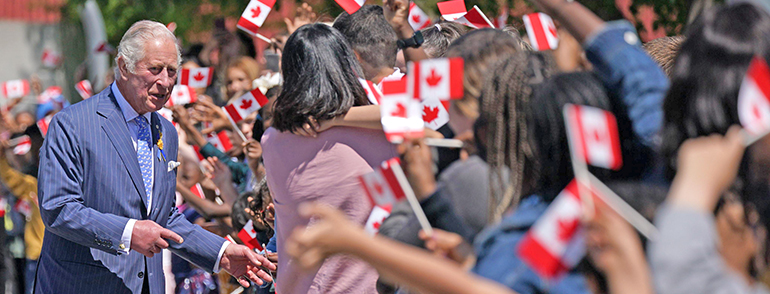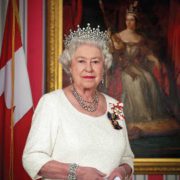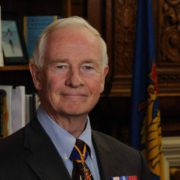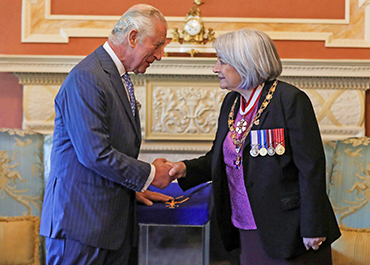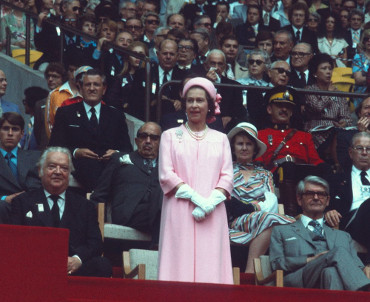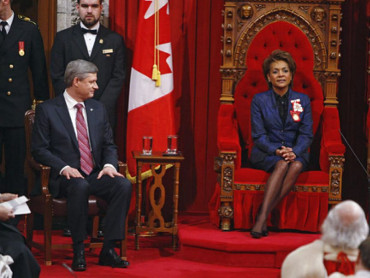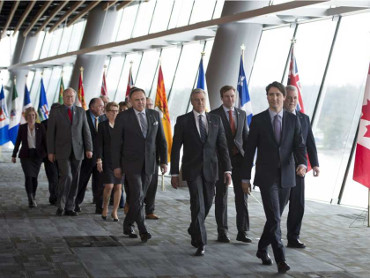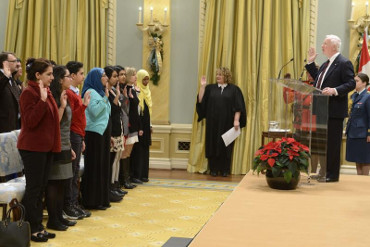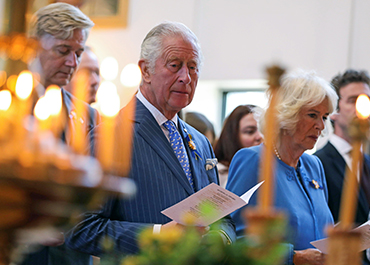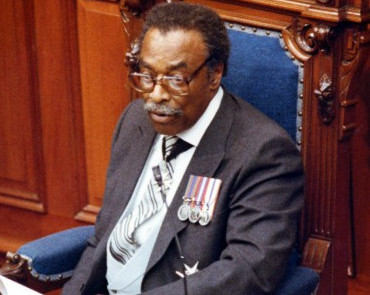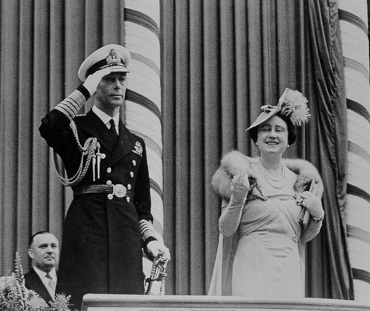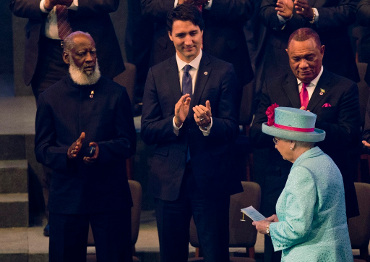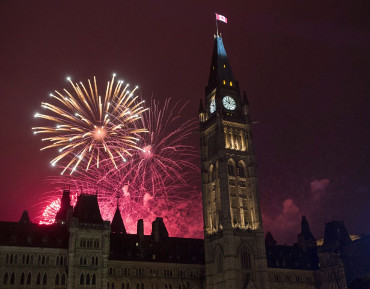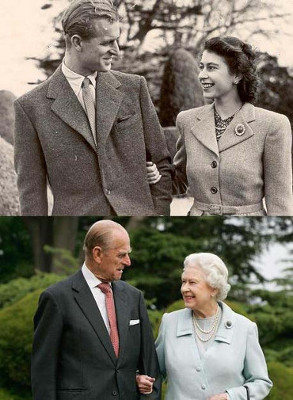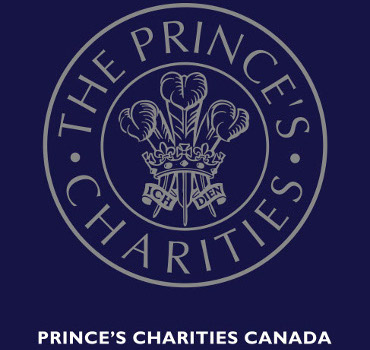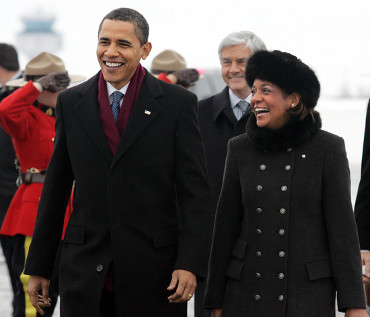Force for National Identity: A Distinct Independence
A central reality of Canadian life is the inevitably overwhelming influence of our friendly neighbour, the United States of America. Free Trade. Continental defence and secure borders in a post-9/11 environment. A porous frontier ranging from television and the Internet to popular music and culture. These and other factors often tend to overwhelm Canada’s national identity. Every nation needs to understand and foster the existence of distinct images and institutions; thus for Canada, constitutional monarchy is of particular importance. It makes Canada unique in the Hemisphere. Its focus of loyalty and allegiance to a respected monarch, and so to our system of governance, rather than to a politician, an ideology, a symbol or a single document, underlies the notably tolerant, mature society which is a source of pride for all Canadians.
Prince Charles with Governor General Mary Simon in Ottawa 2022.
The Queen of Canada Opens the 1976 Summer Olympics in Montreal
Unifying, not divisive: Head of state vs head of government
In a democracy, day-to-day decisions are made by those whom we have elected. Not surprisingly, this partisan political process reflects the things that divide Canadians. It encourages striving for partisan goals and personal success. This sort of debate is both inevitable and healthy in a vigorous democracy.
However, Canada’s constitution separates politics from service, and transient popularity from institutional stability. So the Prime Minister is our head of government and leader of a political party. As such, his actions are often controversial.
The Sovereign, however, is a force of unity, who as head of state embodies all Canada and all Canadians. The monarchy protects and exemplifies the things Canadians agree about, and remain constant, regardless of an election: community, tolerance, nationhood, the rule of law. And by presiding at events such as the Montréal Olympics and Canada Day celebrations on Parliament Hill, The Crown emphasizes the non-partisan, unifying nature of great national occasions.
As Governor General, the Rt Hon. Michaëlle Jean Delivers the Speech from the Throne, 2009
Parliamentary monarchy: Guarantor of freedom
Parliament and the provincial legislatures are composed of The King and elected members — along with the Senate in the case of the federal government. However, no bills, no formal government regulations (“Orders-in-Council”) or no spending is authorized without the agreement of The King or one of her representatives.
In a similar way, Parliament is summoned and dissolved in The King’s name. Also in his name, public officials and diplomats are appointed, treaties approved, and cabinets commissioned and dismissed. Normally, this is a formality. Canadians entrust the nuts and bolts of governing to those whom they have elected, as is appropriate in a democracy.
However, the Crown’s role (the “Royal Prerogative”) remains part of our constitution to ensure that the rules of the game are always followed, and to provide a non-partisan, non-violent safeguard — a constitutional fire extinguisher as Alberta political scientist Frank MacKinnon has put it — should normal democratic processes ever break down or be threatened. For example, even a popular government cannot simply dispense with holding an election.
The Rt Hon. Justin Trudeau meets with Canada’s Premiers, 2016
Neutral referee of federalism: The unity of eleven Crowns
Canada is a federal state. In short, this means that our Constitution gives law-making power in certain areas to the national government, such as the Criminal Code and foreign affairs. Other powers, such as education and municipal affairs, it assigns to the provinces. Each level of government exercises this authority on behalf of its citizens in the name of The King. So in this way it is possible to see the existence of 11 Crowns in Canada — the national Crown and the 10 provincial Crowns — each usually referred to in legal terms such as “The King in right of Canada” or “The King in right of Manitoba”.
The premiers, including the separatist René Levesque, underlined the importance of the Crown in their 1978 statement, above, since the monarchy gives authority to each law-making entity, making them of equal legal significance. It also guarantees that the rule of law will be followed in dealing with any of the many disputes that arise between Ottawa and the provinces.
These facts explain the strong support by the provinces for the institution of monarchy, which reconciles regional identity with national unity.
Personal Allegiance: Process Not Partisanship
Oaths taken by our new fellow Canadians, by MP’s and members of provincial legislatures, by judges, by members of the Canadian Forces and by many other public officials, are all oaths to The King.
By making this promise to the Sovereign rather than to a politician, those who serve us and live in the land show their ultimate loyalty is not to elected figures, but to all Canadians and to the laws that make up the fabric of our civilized society. In this way, process — following the rule of law — triumphs over partisanship — acting to promote the well-being of a narrow segment of society.
The Governor General, the Rt Hon. David Johnston, administering the Oath of Citizenship
Individual Loyalty: The Equality of Every Canadian
The deepest loyalties of women and men are to their fellow human beings. Government carried on in the name of The King reflects Canada’s emphasis on the importance of the person, and of the dignity and equality of each individual who is either born here or who becomes part of our national family. In the same way, the moment new citizens take the Oath of Citizenship they become full and equal members of the Canadian family. Each Canadian gives allegiance to The King, so reciprocating his decades of service as Prince of Wales and now Monarch to all Canada.
World Figure: Represented by Her Canadian Team of Governors
Canadians are fortunate to have as our monarch an instantly recognizable world figure. The King and members of the Royal Family make frequent homecomings to Canada. In their absence, the Governor General (for the national government) and the Lieutenant Governors (one for each provincial government) represent The King and perform most of the constitutional functions of the Sovereign in his name. This arrangement allows our country to share in the traditions of an ancient monarchy stemming out of Canada’s history, while at the same time we enjoy the services of distinguished fellow citizens — think of Major-General Georges Vanier, Lincoln Alexander, David Lam and Lynda Haverstock, to name but a few — who serve Crown and country with great distinction.
The Hon. Lincoln Alexander, former Lieutenant Governor of Ontario
King George VI Visiting Canada, 1939
Reflection of History: Aboriginal, Colonial, Canadian
Today’s monarchy stems from our history. Many of Canada’s First Nations chose tribal chieftains whose role was much like that of the local kings and queens of ancient Europe, Africa, South America and Asia. European explorers and the subsequent settlement by our French and British founding peoples brought to Canada their own experience of monarchy, symbolized by the Fleur de Lys and the Royal Union Flag. Many subsequent immigrants — be they from Russia or Japan, from Italy or Thailand — also knew the monarchical system of government.
In 1867, the Fathers of Confederation unanimously chose constitutional monarchy as Canada’s form of government. In 1982, Canada’s new Constitution reaffirmed and entrenched the Crown so that only unanimous federal-provincial agreement could ever alter it. So it is no surprise that in 2002, throngs hailed The Queen as she crossed Canada from Iqaluit to Fredericton, from Victoria to Toronto, in celebration of the 50th year of her service to this nation, as did unprecedented crowds during Canada Day celebrations on Parliament Hill during her 24th homecoming in 2010.
The 2015 Commonwealth Heads of Government Meeting
Link to Today’s Canada: The Commonwealth Mirrors Our Diversity
Not only King of Canada, Charles III is also Head of The Commonwealth of Nations. This 54-state international body is unique, as it functions not as a military alliance nor a trade bloc, but as a free association among countries of the former British Empire, who now cooperate in a variety of educational, development and social justice initiatives throughout the world. The diversity of these nations’ populations — from New Guinea to Belize, from New Zealand to India — mirrors the rich diversity of today’s Canada. In 2010, our Queen flew from Toronto to New York, were she addressed the General Assembly of the United Nations on behalf of all 16 countries of which she is the head of state. The night before, The Queen proudly told an Official Dinner in Toronto that “I shall be travelling from this Northern Realm as Queen of Canada”.
Evolutionary Society: Canada Prospers under the Crown
Canadians have lived for over 150 years in a tranquil, prosperous society. Unlike most countries, change has been incremental, and not achieved by violence. Much of the credit for this achievement is due to the women and men who have worked together to create a modern, progressive nation, respected around the world.
However, no country can achieve greatness without stable governance. Constitutional monarchy — the Canadian way — continues to provide that stability. This is confirmed each year in the United Nations’ Human Development Index, which regularly ranks Canada in the top five countries in the world.
Stability in a Changing World
Change is inevitable, and much of it good: cell phones, computers, social media. But in this dizzying march to progress, constant change leaves many uncertain or confused. In the same way, political leaders come and go—Kim Campbell and John Turner served as Prime Minister for but a few months. Canadians voted in 20 federal elections during The Queen’s reign! It is a good thing that the Crown provides constancy amidst so much change. The Sovereign has the experience of decades, without the taint of a personal agenda. Such continuity constitutes an important anchor in our society.
Community, Volunteerism, Honours
In their constant round of travels, The King, members of the Royal Family and her Canadian representatives bring enormous encouragement to the communities and volunteer sectors that constitute so vital a part of our national existence. They inspire many to volunteer service. They create and award non-political honours to outstanding fellow citizens.
These Royal and vice-regal activities do not often feature on national news programs. Opening a new library, visiting a Legion Hall, speaking to a school civics class or lunching with a local service club are not on the media’s radar. But they constitute the basis of our civil society, and bring significant pride and assistance to Canada’s communities.
Republicanism: Diversion, Blow to Nationhood, and the Institutionalization of Partisanship
No one has yet proposed an alternative system of government for Canada which would in the same way reflect our nation’s history and be superior to constitutional monarchy in terms of the day-to-day functioning of the Canadian state.
Canadians remember the wrenching constitutional debates that consumed enormous political energy from the mid-1960s through the early 1990s. Chiefly of interest to politicians, these arguments did nothing to effect solutions to the real concerns of our citizens such as crowded classrooms, access to health care, security in an era of terrorism, support for single-parent and low-income families.
A presidential system would make Canada more closely resemble the United States. It would combine the role of head of state with head of government. As our American friends discovered during impeachment processes in the Nixon and Clinton administrations, this proves an unhappy combination. Alternatively, the election of a president or governor general would simply create another politician, offer another level of personal ambition, necessitate another set of elections and make the holder of that office beholden to the interests of the different factions and groups to which the election was owed.
The Rt Hon. Michaëlle Jean with U.S. President Barack Obama
